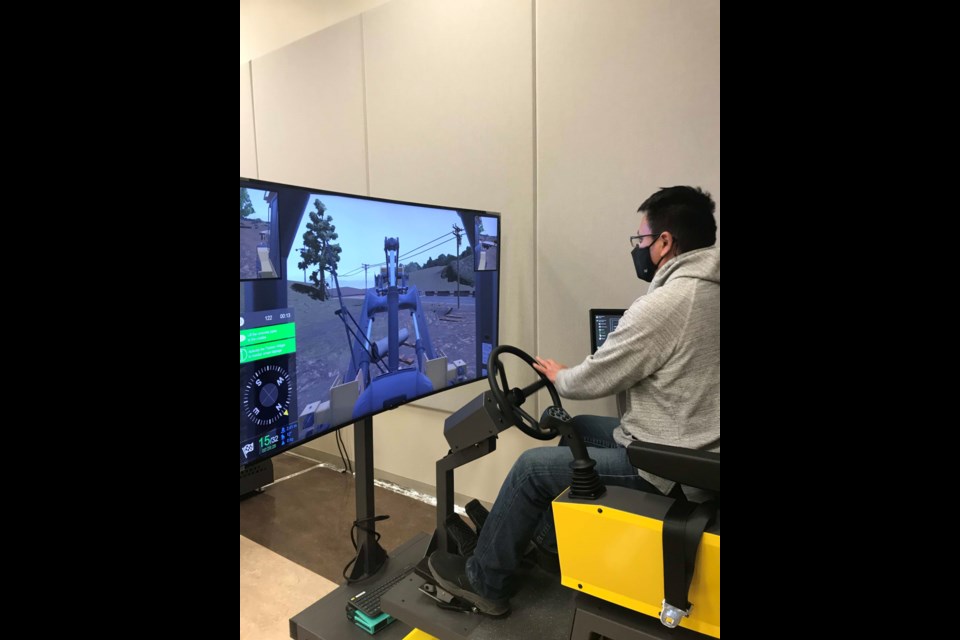The first cohort of students has been busy learning through the new heavy equipment operator (HEO) course at the �鶹��ýAVeast College’s Estevan campus.
Eight started learning April 26. They began with two weeks of safety courses and associated studies programs, and now they’re into the actual HEO curriculum course work and the simulator operation.
“It’s been going really well,” said Sheena Onrait, the college’s manager of marketing and communications. “The students seem to be really excited about the program, excited that they’re the very first … class that the �鶹��ýAVeast College has for this program.”
Six weeks of classroom time and six weeks spent in the field are provided for each cohort. The program is recognized by the Saskatchewan Heavy Construction Association.
During the classes, the students learn the operations of a number of pieces of heavy equipment, such as a grader, excavator, front-end loader, rubber tire hoe and other commonly used machines.
“They learn safety, mechanical operation, maintenance and those kinds of things,” said Onrait.
The simulators are a highlight of the program, as they allow the students to experience the operations.
When Onrait was in a session last week, one student was using a simulator to load a truck, so he was digging with a backhoe and filling the truck repeatedly.
“It times you and it grades you, so it grades your simulation work, and you have to get a certain percentage before you pass that equipment,” said Onrait. “It’s very cool and integrated, and a very interesting way to get experience with a piece of equipment, without actually being on the piece of equipment.”
The simulator offers different degrees of difficulty, from easy to hard, and can include different settings, including darkness, rain and snow.
“Each of those things makes it increasingly challenging, because you’re not always in perfect weather conditions when you’re working outside,” said Onrait.
There are eight simulators in the classroom, so each student could be on their own simulation machine, working at the same time. And they could be doing eight different pieces of equipment as well.
“It’s a great technology piece that we’ve been able to add to the Estevan campus,” said Onrait.
The college has two great instructors, Shane Dawson and William Cartier, who are excited to get this program underway, and they’re experienced HEOs with lots of years in the industry.
“With having two instructors, we’re able to really maximize (our resources), and then have one instructor working in the field with the students, and one instructor taking over the classroom with the new cohort that’s coming in.”
With eight students and two instructors, the ratio is low as well.
“We’re currently still recruiting for cohort number 2 and 3,” said Onrait. “We plan to offer anywhere from three to four programs a year. So three this year, with it being the first year, and then we’re hoping to get to four in the subsequent years.”
Students who are part of this class are from Estevan and the surrounding rural areas, but the program has generated interest from throughout the province.
“We do expect that as the word grows and the word gets out provincially (interest will increase),” said Onrait. “This is an industry-recognized program in Saskatchewan, and we of course have been in partnership with Saskatchewan Heavy Construction right since the start of this. We expect to draw students right from all over Saskatchewan into this program.”
Other programs like it in Saskatchewan are much shorter in length, she said. They might have simulators, but not to the same degree as what the college has.
“It’s great to have a program like this in Saskatchewan. It’s very different from any other program in Saskatchewan,” said Onrait.
With new programs, they never know what kind of response they will receive. But the college did a lot of research and planning with the job market before embarking on the HEO class.
The current cohort will be in the classroom from April 26 to June 4, and then they will have field work from June 7-July 16. The next cohort will start June 7 with the classroom portion, and continue until Aug. 27. The final cohort will be July 19 to Oct. 8. While one group is learning in the field, the next group will be learning in the classroom.




